Search results
Projects
Pet Playing for Placemaking
Designing playful technologies for social engagement and healthy ageing
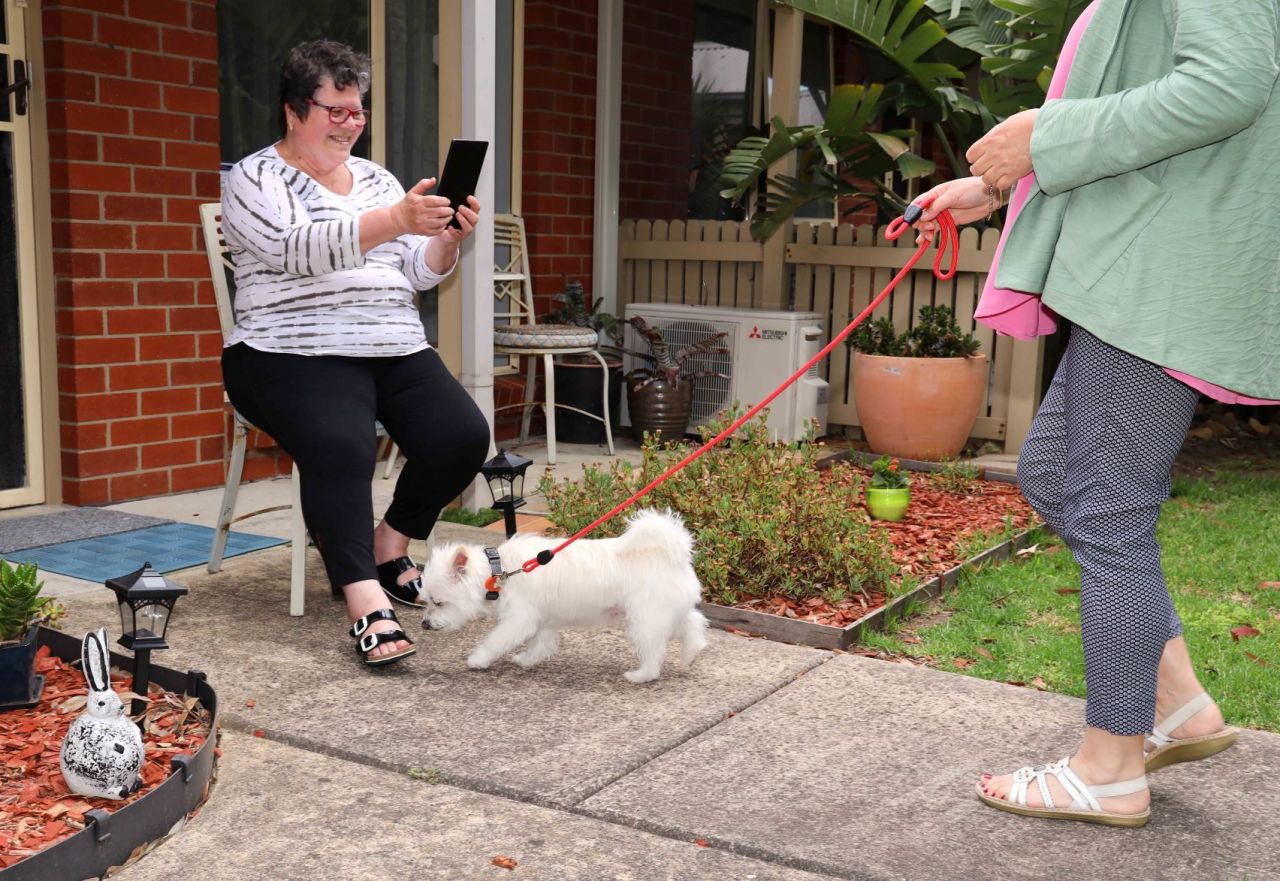
With many pet owners experiencing social isolation during the pandemic, RMIT researchers are collaborating with Cherished Pets Foundation and its affiliated veterinary social enterprise towards improving social inclusion in the local community. The initiative has received community funding to bring an interactive, playful, and creative spin through a game designed to promote social engagement and healthy ageing.
Pet Playing for Placemaking Survey Report — October 2020
2021 Give Where You Live Community Connections Grant
If you would like to get involved with this project, fill out the form below or reach out to project leaders via the contact info provided alongside each bio.
People
Larissa Hjorth
Distinguished Professor and Director, Design and Creative Practice
School: Enabling Capability Platforms
Larissa Hjorth is a digital ethnographer, artist, Distinguished Professor and director of the Design & Creative Practice ECP platform at RMIT University. With Professor Heather Horst, she co-founded the Digital Ethnography Research Centre (DERC). Previously, Hjorth was Deputy Dean, Research & Innovation, in the School of Media & Communication (2013−2016). Hjorth served on the inaugural Australian Research Council (ARC) Engagement & Impact Pilot study assessment panel for humanities and creative practice.
Hjorth studies the socio-cultural dimensions of mobile media and play practices in the Asia-Pacific region with an emphasis on interdisciplinary, collaborative and cross-cultural approaches. She has published a dozen co-authored books, edited over a dozen Handbooks/Companions and has over 40 journal articles.
More recently, Hjorth’s work has become concerned with how we can bring creative, social and design solutions to the growing ageing populations and, in turn, how we might consider scenarios of what it means to die well. She is also studying how our “more-than-human” companions can teach us about new media in everyday life. Hjorth’s last book, Haunting Hands (Oxford Uni Press) looked at how mobile media is being deployed in situations of grief and trauma, her previous book explored how art practice can teach us new acumen into the climate change debate.
Hjorth’s books include Haunting Hands (with Cumiskey 2017), Screen Ecologies (with Pink, Sharp & Williams 2016), Digital Ethnography (Pink et al. 2016) Mobile Media in the Asia-Pacific (2009), Games & Gaming (2010), Online@AsiaPacific (with Arnold 2013), Understanding Social Media (with Hinton 2013), and Gaming in Locative, Social and Mobile Media (with Richardson 2014).
Jacob Sheahan
PhD Candidate
School: School of Design
0424056233
Personal website
jacob.sheahan@rmit.edu.au
Currently undertaking a PhD in Design at RMIT School of Design, Jacob explores socially engaging technology in later life and its shaping by designers. Approaching design research through investigating the materiality of artifacts, and our interactions with them, Jacob seeks to uncover social-technical practices through dialogical and anthropological means.
Alongside his doctorate research, Jacob is involved in ‘Co-designing Participatory Strategies With Older Adults ‘ (Shaping Connections) and ‘Enabling an Ageing Workforce’ (Safeness by Design) research projects. As a sessional lecturer in Design Studies, Jacob hopes to foster research-led and collaborative design practices in socially complex contexts. With a diverse background in the design industry, he is interested in locating design research practice in wider discourses and interrogating its impact.
Creative Care
Exploring creative practice and teaching in health and wellbeing
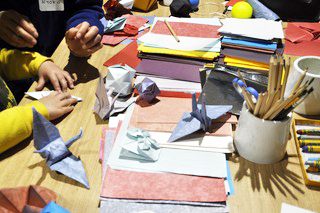
Creative Care researchers and students engage in creative research that intersects with health, wellbeing and the human lived experience. Creative Care projects are undertaken through diverse mediums; they are site specific social practices. The collaborative and interdisciplinary research is realised through exhibitions, performances, events, publications, or undertaken within health and social care settings, and with industry partners.
In August 2019, Creative Care presented Hand Festival at Peter MacCallum Cancer Centre in Melbourne. The team, along with Professor Rebecca Hilton (University Arts Stockholm), organised the social practice choreographed event designed with a focus on the hand for trust and intimate hand activities. Seventeen artists, colleagues, student nurses from RMIT, and Peter Mac staff and patients participated in hand drawing, origami, hand massages, wax modelling, mbira, knitting, cat’s cradle and more. Later that month, the team ran Hands + Mouth: Boundaries of the Body, an experimental and participatory “world cafe” event which explored the boundaries of the body at the end of life (touch, embodiment, gestures and more) through roving conversations about end of life scenarios with a focus on death and dying, ageing and illness and how they intersect with culture, the senses and place.
You can find out more about the Creative Care project on the CAST Website.
If you would like to get involved with this project, fill out the form below or reach out to project leaders via the contact info provided alongside each bio.
People
Keely Macarow
Associate Professor
School: School of Art
Keely Macarow is Coordinator of Postgraduate Research in the School of Art at RMIT. Keely’s research is focused on socially engaged art and the nexus between creative arts, social justice, health and wellbeing, and social and natural science. Currently, Keely is a member of The Untitled (a collective of artists, urban and graphic designers, architects and housing researchers based in Melbourne and Stockholm) who produce creative works, publications and interventions in Australia and Sweden to advocate for Homefullness (rather than homelessness). Her film, video and exhibition projects have been presented in Australia, the UK, the US, Germany, Belgium, Austria, Sweden, Hungary, France, Scotland and Denmark.
Being Wiradjuri Together
Co-designing self determination
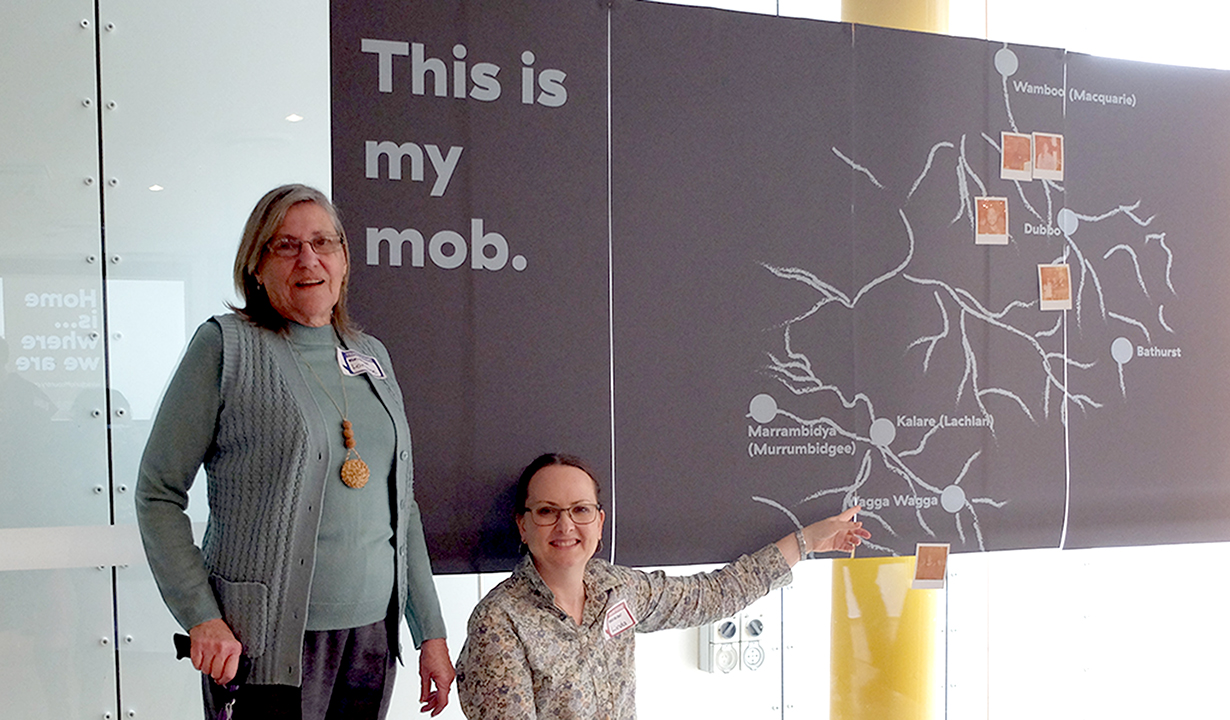
What does it mean to be non-Indigenous and design with, and in response to, Indigenous peoples and knowledge? How can design be of substantial, long-lasting benefit to Indigenous people?
Being Wiradjuri Together is about Wiradjuri people who are self-determining — renewing cultural practices and expressing what it means to be Wiradjuri. This is catalyzed through co-designing with Wiradjuri to create various mechanisms — print, video, social media, digital platform and community events — to connect, share and be Wiradjuri together.
If you would like to get involved with this project, fill out the form below or reach out to project leaders via the contact info provided alongside each bio.
People
Peter West
Lecturer, Communication Design
School: Media and Communication
Peter West is a Communication Design lecturer and PhD candidate. He has a diverse teaching practice which moves across areas such as communications strategy, art direction and design for social change. He draws upon practical industry experience as both a freelance art director and copy writer within both multinational communications agencies and health related communications strategies within the not for profit sector.
His research focuses on ways in which Non-Indigenous creative practitioners can better understand their subject position in relation to Indigenous sovereignty. West is as a chief investigator on Sovereign Weaving Project: ‘Practicing Sovereign Relations through Weaving a Treaty’. The project seeks to support Indigenous Nations to practice their sovereignty, through the realisation of a woven treaty as the conclusion of their diplomatic responsibilities.
Sharing animal pictures on social media
Pandemic Strategies of Care

We are researchers from RMIT. We invite you to take part in this research project exploring the sharing of animal pictures on social media as part of pandemic strategies of care.
The aim of this research is to understand the motivations, and collect examples, of sharing animal pictures on social media as part of pandemic strategies of care. It seeks to provide details into meanings as part of this cultural practice.
If you decide you want to take part in the research project, you can access the Participant Information and Consent Form below. It tells you about the research project and explains the processes involved with taking part. Knowing what is involved will help you decide if you want to take part in the research.
Participation is easy. Just email your images and comments to the lead researcher, Professor Larissa Hjorth: larissa.hjorth@rmit.edu.au
We would love to have you and your pets involved!
If you would like to get involved with this project, fill out the form below or reach out to project leaders via the contact info provided alongside each bio.
People
Larissa Hjorth
Distinguished Professor and Director, Design and Creative Practice
School: Enabling Capability Platforms
Larissa Hjorth is a digital ethnographer, artist, Distinguished Professor and director of the Design & Creative Practice ECP platform at RMIT University. With Professor Heather Horst, she co-founded the Digital Ethnography Research Centre (DERC). Previously, Hjorth was Deputy Dean, Research & Innovation, in the School of Media & Communication (2013−2016). Hjorth served on the inaugural Australian Research Council (ARC) Engagement & Impact Pilot study assessment panel for humanities and creative practice.
Hjorth studies the socio-cultural dimensions of mobile media and play practices in the Asia-Pacific region with an emphasis on interdisciplinary, collaborative and cross-cultural approaches. She has published a dozen co-authored books, edited over a dozen Handbooks/Companions and has over 40 journal articles.
More recently, Hjorth’s work has become concerned with how we can bring creative, social and design solutions to the growing ageing populations and, in turn, how we might consider scenarios of what it means to die well. She is also studying how our “more-than-human” companions can teach us about new media in everyday life. Hjorth’s last book, Haunting Hands (Oxford Uni Press) looked at how mobile media is being deployed in situations of grief and trauma, her previous book explored how art practice can teach us new acumen into the climate change debate.
Hjorth’s books include Haunting Hands (with Cumiskey 2017), Screen Ecologies (with Pink, Sharp & Williams 2016), Digital Ethnography (Pink et al. 2016) Mobile Media in the Asia-Pacific (2009), Games & Gaming (2010), Online@AsiaPacific (with Arnold 2013), Understanding Social Media (with Hinton 2013), and Gaming in Locative, Social and Mobile Media (with Richardson 2014).
Young people and the Anthropocene
Critical perspectives for well-being, resilience and enterprise
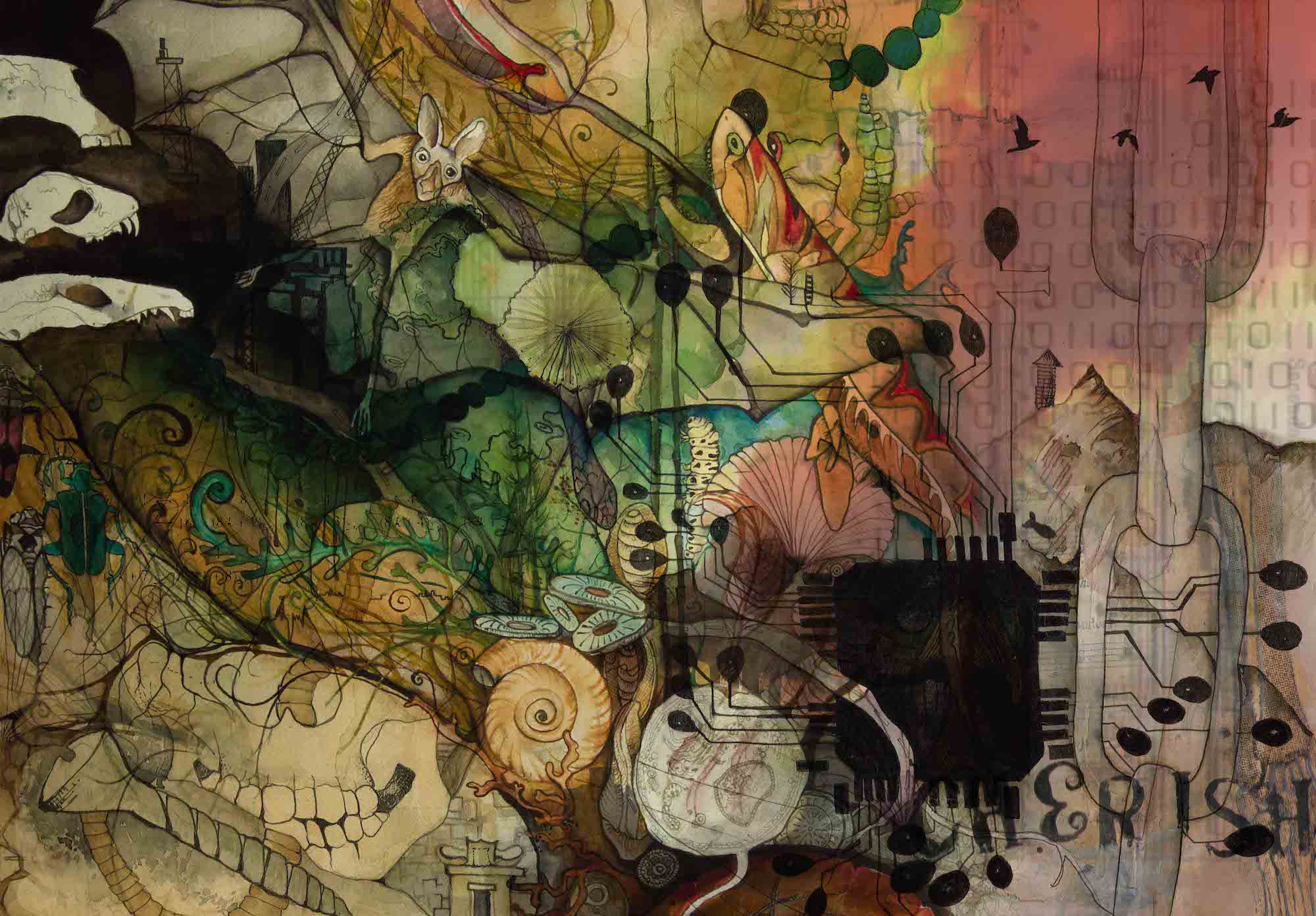
The social sciences and humanities must critically engage with the debates about the Anthropocene since humans are by definition driving the issues facing the these planetary-wide changes and the consequences that ensue. We need to find new ways of thinking through and understanding the unfolding crisis of planetary environmental systems by developing divergent forms and methods of communicating.
This project has as its aim instigating an international agenda for collaborative knowledge production and exchange that centre around well-being, resilience and enterprise for children and young people around the globe.
You can find out more about Young people and the Anthropocene here.
If you would like to get involved with this project, fill out the form below or reach out to project leaders via the contact info provided alongside each bio.
People
Peter Kelly
Professor
School: Education
Peter Kelly is Professor of Education and Head of UNESCO UNEVOC at RMIT University. His recent former role was as Associate Dean, Research and Innovation, in the School of Education at RMIT. Previous positions include at Edge Hill University (UK), Deakin University, Monash University, the University of Queensland (UQ).
Kelly is a social researcher who has published extensively on young people, social theory and globalisation. His current research interests include a critical engagement with young people and new cultures of education/work/democracy in the context of the aftermath of the Global Financial Crisis, and with the challenges associated with the emergence of the Anthropocene. He is currently the lead CI on an ARC Discovery Project (DP 170100547) Art Based Social Enterprises and Marginalised Young People’s Transitions.
With colleagues, Kelly leads a research program titled Young People’s Well-being, Resilience and Enterprise: Critical Perspectives for the Anthropocene: https://youngpeopleanthropocene.org/
Kelly has published extensively on young people and the practice of youth studies. His books include: Working in Jamie’s Kitchen: Salvation, Passion and Young Workers (2009), The Self as Enterprise: Foucault and the “Spirit” of 21st Century Capitalism (2013), The Moral Geographies of Children, Young People and Food: Beyond Jamie’s School Dinners (2014), A Critical Youth Studies for the 21st Century (2015), Young People and the Aesthetics of Health Promotion: Beyond Reason, Rationality and Risk (2016), and Neo-Liberalism and Austerity: The Moral Economies of Young People’s Health and Well-Being (2017). He has two recently published books: Rethinking Young People’s Marginalisation: Beyond neo-Liberal Futures? (2018), Young People and the Politics of Outrage and Hope (2018).
News and updates
Centre for Innovative Justice Perpetrator Service Mapping – 2018 Good Design Award, Communication Design Print
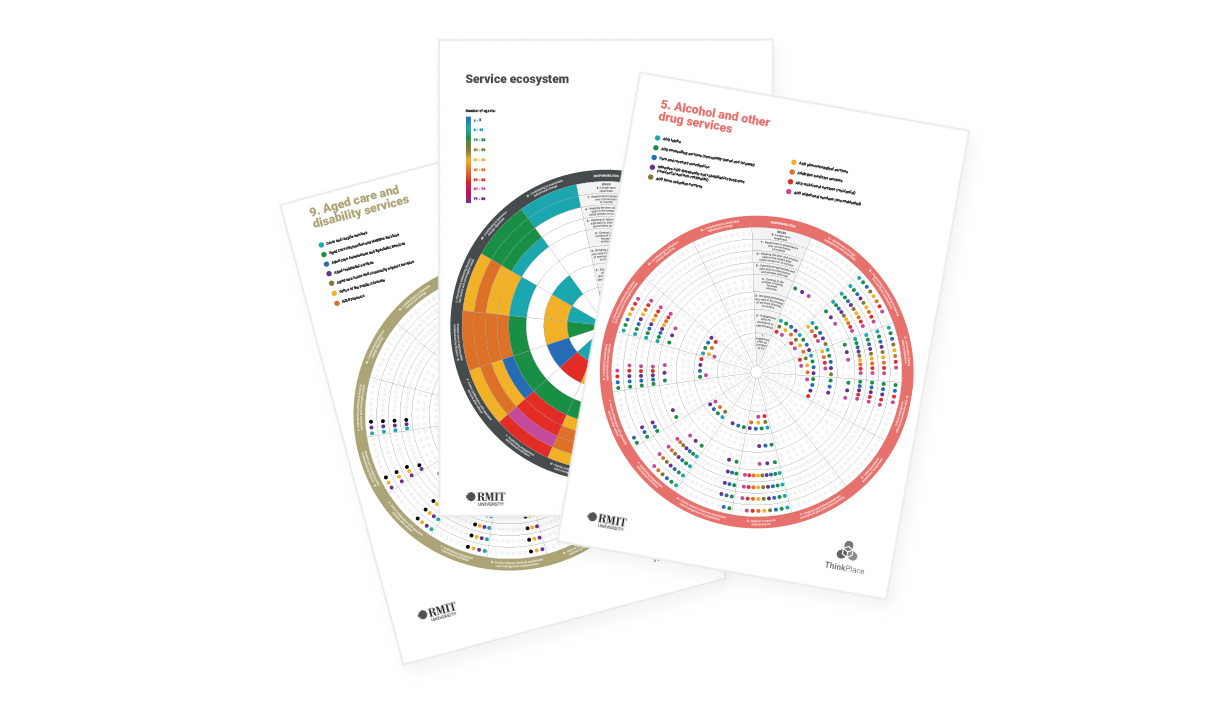
RMIT’s Centre of Innovative Justice worked with ThinkPlace to transform a complex dataset which maps the roles and responsibilities of all government and non-government agencies and service providers who have contact with perpetrators of family violence in Victoria into a stunning set of visualisations. Read more
Being Wiradjuri Together – Winner 2018 Good Design Award, Social Impact

An interactive Wiradjuri-RMIT project is among the winners in the social impact category at the 2018 Good Design Awards. Read more
People
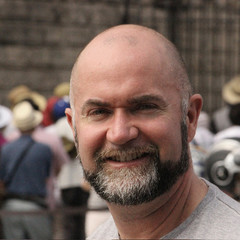
Peter West is a Communication Design lecturer and PhD candidate. He has a diverse teaching practice which moves across areas such as communications strategy, art direction and design for social change. He draws upon practical industry experience as both a freelance art director and copy writer within both multinational communications agencies and health related communications strategies within the not for profit sector.
His research focuses on ways in which Non-Indigenous creative practitioners can better understand their subject position in relation to Indigenous sovereignty. West is as a chief investigator on Sovereign Weaving Project: ‘Practicing Sovereign Relations through Weaving a Treaty’. The project seeks to support Indigenous Nations to practice their sovereignty, through the realisation of a woven treaty as the conclusion of their diplomatic responsibilities.
Peter Kelly is Professor of Education and Head of UNESCO UNEVOC at RMIT University. His recent former role was as Associate Dean, Research and Innovation, in the School of Education at RMIT. Previous positions include at Edge Hill University (UK), Deakin University, Monash University, the University of Queensland (UQ).
Kelly is a social researcher who has published extensively on young people, social theory and globalisation. His current research interests include a critical engagement with young people and new cultures of education/work/democracy in the context of the aftermath of the Global Financial Crisis, and with the challenges associated with the emergence of the Anthropocene. He is currently the lead CI on an ARC Discovery Project (DP 170100547) Art Based Social Enterprises and Marginalised Young People’s Transitions.
With colleagues, Kelly leads a research program titled Young People’s Well-being, Resilience and Enterprise: Critical Perspectives for the Anthropocene: https://youngpeopleanthropocene.org/
Kelly has published extensively on young people and the practice of youth studies. His books include: Working in Jamie’s Kitchen: Salvation, Passion and Young Workers (2009), The Self as Enterprise: Foucault and the “Spirit” of 21st Century Capitalism (2013), The Moral Geographies of Children, Young People and Food: Beyond Jamie’s School Dinners (2014), A Critical Youth Studies for the 21st Century (2015), Young People and the Aesthetics of Health Promotion: Beyond Reason, Rationality and Risk (2016), and Neo-Liberalism and Austerity: The Moral Economies of Young People’s Health and Well-Being (2017). He has two recently published books: Rethinking Young People’s Marginalisation: Beyond neo-Liberal Futures? (2018), Young People and the Politics of Outrage and Hope (2018).
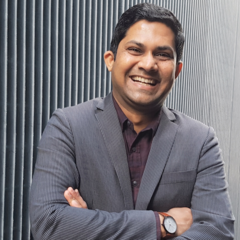
Dr Rohit Ashok Khot is the Deputy Director of the Exertion Games Lab; and Vice-Chancellor’s Postdoctoral Fellow at RMIT University, Australia. Rohit’s research embodies interdisciplinary strength and explores the amalgamation of design and technology in a creative way.
Dr Khot’s track record includes 39 scholarly publications in last 7 years, the majority of which appear in highly competitive HCI conferences and journals and include one best paper and one honorable mention (top 5%) award. Dr Khot’s research also appeared on 30+ press articles including a cover story on Mashable Australia, IEEE Spectrum and TV coverage on Channel 9 News and ABC News 24. He has won prestigious awards including IBM PhD fellowship (2014−2015), 2017 RMIT HDR Prize for Research Excellence (2017), RMIT Vice-chancellor’s Postdoctoral Research Fellowship (2017−2019) and SIGCHI Development Fund Grant (2017,2018). Dr Khot is also involved in organization and management of the Special Interest Group meetings, workshops and symposiums at leading international conferences specifically around food and play, besides serving on program committees for leading international HCI conferences, including DIS and TEI.
Rohit is passionate about playful Human-Food Interaction (HFI) and has an ambitious goal to alter the common perception that food cannot be healthy and pleasurable at the same time.

Dr Fleur Watson is a curator and editor specialising in architecture and design.
Fleur Watson was the Curator at RMIT Design Hub – a building dedicated to cross-disciplinary design research and experimentation. Fleur has managed and co-curated a diverse range of exhibitions for Design Hub including Las Vegas Studio, Brook Andrew : De Anima, The Future Is Here (in collaboration with London’s Design Museum), 100 Chairs in 100 Days: Martino Gamper and, most recently, Occupied curated with Otherothers. Extending upon her curatorial role, Watson leads the RMIT University design partnership with the National Gallery of Victoria and recently contributed as an invited judge for the NGV’s architecture competition towards the 2016 NGV Summer Architecture Commission.
In 2013, Watson was an invited architecture and design curator for the National Gallery of Victoria’s Melbourne Now exhibition and co-produced the installation Sampling The City. She also founded Pin-up Architecture & Design Project Space – an independent exhibition space in Collingwood (2011−2014). Watson is a former editor of Monument magazine (2001−2007), the editor of the Edmond & Corrigan monograph Cities of Hope: Remembered/Rehearsed and, most recently, co-edited an issue of Architectural Design UK (May/June 2015) with RMIT University’s Innovation Professor of Architecture Leon van Schaik AO. In 2015, she completed a practice-based PhD at RMIT University entitled The Agency of Encounter: Performative curatorial practice for architecture and design.
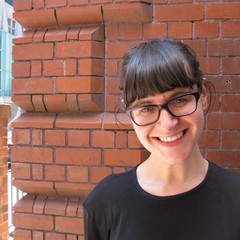
Nella Themelios is a curator, writer and producer. She currently holds the position of Creative Producer at Design Hub, RMIT and is also the Chair of the Board of Victorian artist run initiative, Bus Projects. Previous to this she was the Coordinating Curator at Craft Victoria, the peak body for craft and design in Melbourne. She holds a Bachelor of Arts (Cultural Studies) and a Graduate Certificate (Art History) from the University of Melbourne and is currently completing a Masters degree in Curatorship at the same institution. She has written numerous catalogue essays and produced projects across a variety of disciplines. Recent curatorial projects include: Signature Style (2013) (a NETS touring exhibition); Dolci & Kabana: #thathautecouturefeeling (with Ricarda Bigolin) (2013); Bless: No 38 Windowgarden (2011); Play with your Food (with Drew Pettifer) (21010÷11), The Sound Playground (with Amelia Barikin) (2010); Chicks on Speed: Viva la Craft! (2009).

Professor Anton James, who trained as a landscape architect and visual artist, has over a period of 20 years designed projects in Australia, Europe and the USA. He has won numerous awards and competitions, both in Australia and overseas. His work continues to focus on design as a means to explore a site’s spatial, environmental and material tension for their potential to enrich the urban experience.
As a working director of JMD design, Anton’s focus on design and innovation continues to contribute to the quality of the built environment. In 2011 he was the recipient of the Australian Medal for Landscape Architecture for the Paddington Reservoir.

Shelley is the Director of the Business and Human Rights Centre at RMIT University, Melbourne, Australia.
Shelley has undertaken empirical research on these topics in diverse countries, including Bulgaria, India, Indonesia, Australia and Cambodia, and has published widely based on her findings. Her high standing as a scholar has been recognised through the award a number of large multi-country grants, and she has undertaken collaborations with scholars from Cambridge University, Harvard University, Melbourne University and RMIT. Dr Marshall’s long term partnerships with the technical arm of the International Labour Organisation, Oxfam Australia and CORE UK have enabled her to produce research of a highly applied nature, which has had a strong policy influence and provided meaningful lessons for business and other relevant organisations. Likewise, Shelley’s leadership on the Steering Committee of the Australian Corporate Accountability Network has provided opportunities to influence Business and Human Rights policy in Australia.
Dr Marshall holds a Bachelors of Arts with a double major in Social Theory and Political Science and a Bachelor of Law from the University of Melbourne. She studied a Masters of Science in Development Studies at the London School of Economics and Political Science, where the focus was on economic policy. In 2015, she was awarded a Doctor of Philosophy in Regulation Justice and Diplomacy which she undertook at the RegNet School of Regulation and Global Governance, Australian National University under the supervision of Peter Drahos, Valerie Braithwaite and John Braitwaite. Dr Marshall is a Vice Chancellor’s Senior Research Fellow at RMIT University and an Australian Research Council DECRA Research Fellow.
